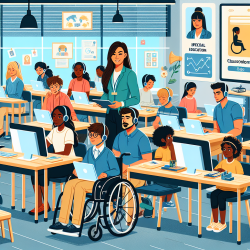In the ever-evolving landscape of special education, innovative approaches to training and supervision are crucial. A recent study titled Effectiveness of Remote Delayed Performance Feedback on Accurate Implementation of Caregiver Coaching offers compelling insights into how remote supervision can significantly enhance the fidelity of caregiver coaching among behavior analysis trainees.
As a Special Education Director, you are acutely aware of the challenges posed by therapist staffing shortages and the need for effective supervision. This study highlights a promising solution: remote delayed performance feedback. Here are the key takeaways and actionable steps you can implement to improve your team's skills and ultimately benefit the students and families you serve.
Key Findings
- Remote delayed performance feedback significantly increased the accuracy of caregiver coaching among behavior analysis trainees.
- Participants met mastery criteria within an average of five remote supervision sessions.
- Feedback sessions were concise, averaging around 9 minutes, making them an efficient use of time.
- Participants reported high levels of satisfaction with remote supervision, despite a preference for in-person feedback.
Actionable Steps
1. Implement Remote Supervision
Leverage technology to provide remote supervision to your team. Platforms like Zoom or VSee can facilitate real-time observation and feedback, reducing the logistical challenges of in-person supervision.
2. Use Delayed Performance Feedback
Provide feedback after the completion of caregiver coaching sessions. This approach minimizes interruptions and allows for a more reflective and comprehensive review of performance.
3. Foster a Culture of Question-Asking
Encourage your team to ask questions during feedback sessions. The study found that participants who asked more questions showed greater improvement in their coaching skills.
4. Track and Analyze Errors
Systematically track common errors and provide targeted feedback. Focus on areas like modeling correct implementation and providing rationales for corrections to improve overall performance.
Benefits of Remote Supervision
- Increased access to quality supervision across geographic locations.
- Continuity of supervision despite travel or relocation.
- Efficient use of time, allowing supervisors to manage more supervisees effectively.
By integrating these findings into your supervision practices, you can enhance the skills of your team, improve the fidelity of interventions, and ultimately provide better outcomes for your students. Remote delayed performance feedback is not just a temporary solution for pandemic-related challenges; it's a sustainable approach that can revolutionize how we train and supervise special education professionals.
To read the original research paper, please follow this link: Effectiveness of Remote Delayed Performance Feedback on Accurate Implementation of Caregiver Coaching.










